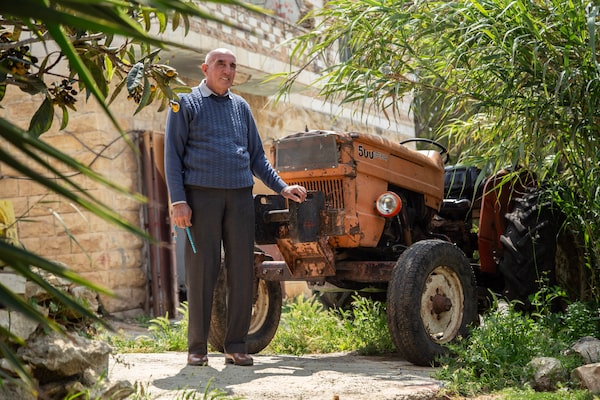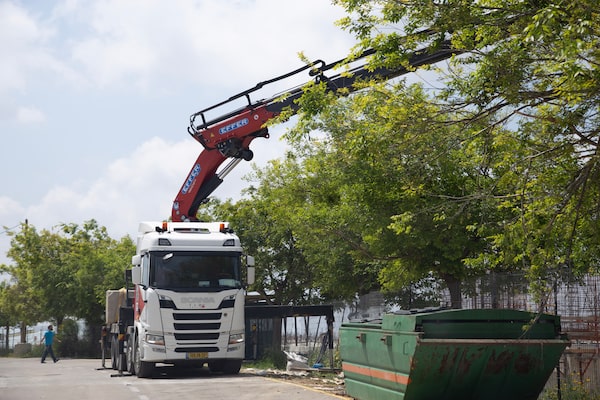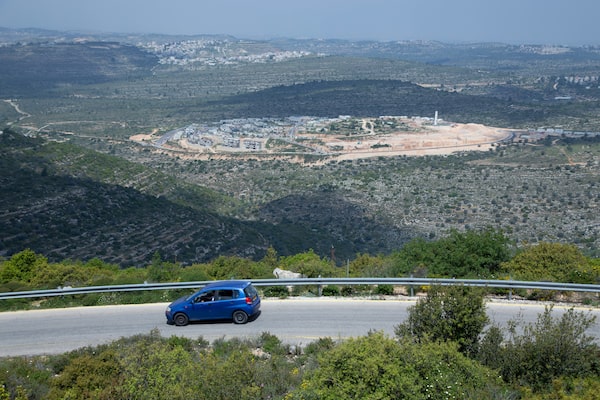
Palestinian farmer Samhan Mohammad Shreiteh at his home in Al-Mazra'a al-Qibliya on April 13. He has been blocked from accessing the land that his family farms and relies on for income.Nathan VanderKlippe/The Globe and Mail
The spring at Ayn Harrashah emerges from the ground in a shallow valley green with olive, lemon, walnut, pomegranate and fig trees. Its waters fill a square basin that provides irrigation for vegetables during the summer months. It is the lifeblood of the 40-hectare Shreiteh family farm and the dozens of people who rely on its production.
One day after the war began in Gaza, however, Samhan Mohammad Shreiteh and his daughter encountered a group of armed soldiers and Israelis who blocked them from accessing the land.
“The soldiers told me, ‘Don’t come back here again until the war ends,’” he recalled.
More than six months later, he has not returned. His olive trees went unharvested in the fall. His vegetable plots were not planted this spring. If he is not able to irrigate the lemon trees through the coming dry season, they may die.
“For hundreds of years, this land has been our source of life, our source of income,” he said. But since Oct. 7, when Hamas militants attacked Israel, “nothing.”

Construction is underway to expand the Israeli settlement of Harsha on April 15, near the spring at Ayn Harrashah which provides water for Palestinian farmers in the area.Nathan VanderKlippe/The Globe and Mail
Israelis in the nearby settlement of Harsha say the war has elevated safety concerns and they need a bigger buffer zone to protect their homes from Palestinians. The settlers keep dogs chained to metal cables strung to form a perimeter overlooking an access road to Ayn Harrashah. In March, Canadian diplomats visiting nearby dove for cover when they heard shots fired.
Harsha resident David Remel, 19, says it is about keeping the peace.
“Tall fences make good neighbours,” he said. He has little sympathy for the Shreiteh family. “Everyone loses money in war.”
But as tens of thousands of Palestinians have died in Israel’s shooting war with Hamas in Gaza, forcing nearly two million people from their homes, a simultaneous “silent war is happening in the West Bank,” one that is pushing people from agricultural areas and expanding the boundaries of Israeli settlement, said Abbas Milhem, the executive director of the Palestinian Farmers’ Union.
Last year, Palestinian farmers were unable to harvest roughly half the olive crop. Their union estimates losses of US$60-million.
In the Jordan Valley, it says, Palestinians have lost access to 25,000 hectares of grazing areas and cropland.
Mr. Milhem faults the “settler shepherds” – Israelis who began to use herds of cattle and sheep as occupation forces several years ago, pushing Palestinians from prime agricultural land.
Dogs are kept on lines that form a perimeter around the Israeli settlement of Harsha. Israeli settlers keep dogs chained to metal cables strung to form a perimeter overlooking an access road to Ayn Harrashah.Nathan VanderKlippe/The Globe and Mail
Palestinian herds, meanwhile, have shrunk dramatically. In 2021, the union counted 1.75 million goats and sheep in Palestinian areas. By last August, it had fallen to 700,000. Mr. Milhem believes no more than 500,000 remain today, and fields have become battlegrounds.
On April 12, Benjamin Achimeir, a 14-year-old from the settlement outpost of Malachei Shalom, was killed after leaving home to tend sheep. Security services called the teenager’s death a terror attack, and his death provoked a furious response. Hundreds of settlers set fire to homes and cars in the Palestinian town of al-Mughayyir. Two Palestinians died in the rampage, which also left dozens of sheep dead.
Mohammed Ilwan, a local farmer, said the attack was preceded by months of hardship: “We have been suffering tremendously in terms of farming and harvesting since Oct. 7.”
He said the sheep herded by the teen were grazing lands “that are privately owned by Palestinians. They have been stolen by settlers through their grazing project.”
His neighbours have also reported stolen cattle, he said.
Water supplies, too, have been a target. The farmers’ union has counted 10 instances of concrete poured into Palestinian wells to choke their flow.
Others, like Mr. Shreiteh, no longer have access to vital wells.
The Israeli military said its soldiers have not prevented the family from working its land. “There is no legal guideline nor a physical barrier preventing access to the area in question,” the Israel Defence Forces said in an e-mailed statement.
But even foreign emissaries have encountered obstacles to visiting the area.
When the German Foreign Affairs Minister approached the vicinity of Ayn Harrashah, a drone flew overhead blaring siren sounds, a diplomat with knowledge of the events said. The Globe and Mail is not identifying the person because they were not authorized to speak publicly.

Settlement construction is visible from Harsha, an Israeli settlement in the West Bank.Nathan VanderKlippe/The Globe and Mail
Two gunshots rang out when a team of Canadian diplomats arrived in advance of a visit near Harsha by Foreign Affairs Minister Mélanie Joly, the person said. Ms. Joly came to the area days later without incident.
Canada is “gravely concerned by reports of Palestinian communities being forcibly removed from their lands in the West Bank,” Global Affairs Canada said in a statement. It called on the Israeli government to stop settler violence and hold those responsible accountable.
Ms. Joly has promised to impose sanctions against settlers committing violence, but Canada has yet to take action.
Seventy-five families live in Harsha, which was founded in 1997 when students from a nationalist yeshiva in Jerusalem began to occupy a hill overlooking Ayn Harrashah. (Canada considers West Bank settlements illegal; Israel says it has historical rights to the land.)
Signs of expansion in Harsha abound. On one cleared lot, a group of people gather around blueprints spread out on the hood of a pickup truck. A large crane moves construction materials onto a row of new homes built on a bluff.
In the valley below, an Israeli flag flies over Ayn Harrashah. The first settlers built their own mikveh pool for religious purification but preferred to swim in the deeper waters of Ayn Harrashah.
“It’s one of the best springs in the area,” said David Cohen, a 20-year-old construction worker who grew up in Harsha. (Mr. Remel, the 19-year-old resident, said he had returned to the spring since the war began.)
Ilan Giat, a spokesman for the settlement, said a decision was made “in co-operation with military officials” to treat the surrounding area as “a sensitive and delicate place” after the Oct. 7 attacks.
Harsha’s residents, he said, fear Palestinians living nearby “will do everything in their power to continue what happened on Oct. 7.”
Mr. Shreiteh looks over the valley near his home in Al-Mazra'a al-Qibliya. He says there is no security threat or justification for keeping his family from tending their orchards and vegetables.Nathan VanderKlippe/The Globe and Mail
Since then, 464 Palestinians have been killed in the West Bank, according to local authorities, while five Israelis were killed in the first 100 days of the war, according to Rescuers Without Borders, an Israeli emergency service.
Mr. Giat faults Mr. Shreiteh’s community for supporting Hamas – and Mr. Shreiteh himself for building a road and developing his farm without permission.
“He does everything in his power to prevent Jews from coming to the area,” Mr. Giat said. “He polluted the spring water with cow excrement in order to prevent bathing in it or drinking from it and he aids and abets incidents of disorder.”
Mr. Shreiteh acknowledges dumping manure into the spring to keep away bathers who, he said, grew angry when he pumped out its waters for irrigation.
But, he asked, how can that constitute a rationale for keeping his family from tending their orchards and vegetables?
“There is no justification whatsoever, because there is no security threat,” he said. “It’s a farming area.”
 Nathan VanderKlippe
Nathan VanderKlippe